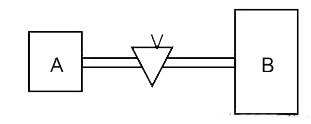If the temperature of an ideal gas in a sealed, rigid container is increased to 1.5 times the initial value (in K), the density of gas
becomes 1.5 times the initial value
becomes 2.5 times the initial value
becomes 2.25 times the initial value
remains same
The correct Answer is:D
To solve the problem, we need to analyze how the density of an ideal gas changes when its temperature is increased while keeping the volume constant.
1. Understanding Density:
Density (ρ) is defined as the mass (m) of the gas divided by its volume (V):
ρ=mV
2. Conditions Given:
- The gas is in a sealed, rigid container, which means the volume (V) does not change.
- The temperature of the gas is increased to 1.5 times its initial value (T→1.5T).
3. Ideal Gas Law:
The ideal gas law states:
PV=nRT
Where:
- P = pressure
- V = volume
- n = number of moles
- R = universal gas constant
- T = temperature in Kelvin
4. Constant Mass and Volume:
Since the container is sealed, the mass of the gas remains constant, and since it is rigid, the volume also remains constant. Therefore, the number of moles (n) remains constant.
5. Effect of Temperature on Pressure:
When the temperature increases, according to the ideal gas law, if the volume is constant, the pressure must increase. However, this does not affect the mass or volume of the gas.
6. Density Calculation:
Since both the mass and volume of the gas remain unchanged, the density will also remain unchanged:
New Density=mV=Initial Density
7. Conclusion:
The density of the gas will remain the same even after the temperature is increased.
Final Answer:
The density of the gas remains unchanged.
---
Density (ρ) is defined as the mass (m) of the gas divided by its volume (V):
ρ=mV
- The gas is in a sealed, rigid container, which means the volume (V) does not change.
- The temperature of the gas is increased to 1.5 times its initial value (T→1.5T).
The ideal gas law states:
PV=nRT
Where:
- P = pressure
- V = volume
- n = number of moles
- R = universal gas constant
- T = temperature in Kelvin
Since the container is sealed, the mass of the gas remains constant, and since it is rigid, the volume also remains constant. Therefore, the number of moles (n) remains constant.
When the temperature increases, according to the ideal gas law, if the volume is constant, the pressure must increase. However, this does not affect the mass or volume of the gas.
Since both the mass and volume of the gas remain unchanged, the density will also remain unchanged:
New Density=mV=Initial Density
The density of the gas will remain the same even after the temperature is increased.
The density of the gas remains unchanged.
Similar Questions
Temperature of an ideal gas increases in:
View SolutionThe temperature of an ideal gas increases in an:
View SolutionThe diffusion coefficient of an ideal gas is proportional to its mean free path and mean speed. The absolute temperature of an ideal gas is increased 4 times and its pressure is increased 2 times.As a result, the diffusion coefficient of this gas increases x times. The value of x is........
View SolutionIncrease in temperature of a gas filled in a container would lead to :
View SolutionIf an ideal gas at 100 K is heated to 109 K in a rigid container, the pressure increases by X%. What is the value of X?
View SolutionTwo moles of an ideal gas is contained in a cylinder fitted with a frictionless movable piston, exposed to the atmosphere, at an initial temperature T0. The gas is slowly heated so that its volume becomes four times the initial value. The work done by gas is
View SolutionContainer A holds an ideal gas at a pressure 1×105 Pa and at 300 K. Container B whose volume is 4 times the volume of A has the same ideal gas at 400 K and at a pressure of 5×105

The valve V is adjusted to allow the pressure to equalize, but the temperature of each container is kept constant at the initial value, then the pressure in the two containers is :
View SolutionThe pressure of a gas filled in a closed containeer increases by 1% when temperature is increased by 1∘C. Find the initial temperature of the gas.
View SolutionBy increasing temperature of gas by 5∘C its pressure increase by 0.5% from its initial value at constant volume then what is initial temperature of gas?
View SolutionThe temperature of a ideal gas is increased for 100 k to 400k. If at 100 K the root mea square velocity of the gas molecules is v, at 400K it becomes
View Solution
